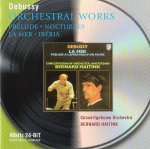This Debussy reissue is a must-have for any collection. The Prélude (recorded in 1976) is beautifully and affectingly done. While the un-credited flute soloist is excellent, best of all is Haitink’s skill at layering textures during louder, faster moving sections. Sonics are fabulous, exemplified in the ideally balanced passages toward the close involving stopped horns, and notably where Chinese miniature cymbals are added as the main theme recurs (often recorded at too low a level). The 1979 account of Debussy’s Nocturnes is one of the very best recordings of the work. Few versions of Fêtes build such a spectacular crescendo from the entry of the two muted trumpets, joined later by side drums, producing a thrilling wave of sound as the festival procession passes. But at the loudest point, note that the violins’ unison restatement of the theme introduced earlier by the winds is still perfectly audible.
La Mer is majestic and brilliantly done. The solo cellos midway through “From dawn to mid-day at sea” don’t need help from the mixer as the Concertgebouw acoustic captures their richness naturally, and every passing detail (particularly cor anglais, solo violin, and tuned percussion) in “Play of the waves” is breathtakingly clear. Haitink builds one of the most trenchant and powerful finales, but the central section (its tension held by the high violin harmonic sustained over a burgeoning theme in the winds) is memorable, as is the vehement closing section. Lastly, Haitink is very effective at distilling the colors and scents of Ibéria, but Boulez’s Cleveland recording for DG of Images will be a strong contender if you want this work complete. Haitink’s Concertgebouw Debussy performances, though, are pretty well unbeatable, and the new Philips 50 transfers are equally outstanding. [6/27/2001]
































